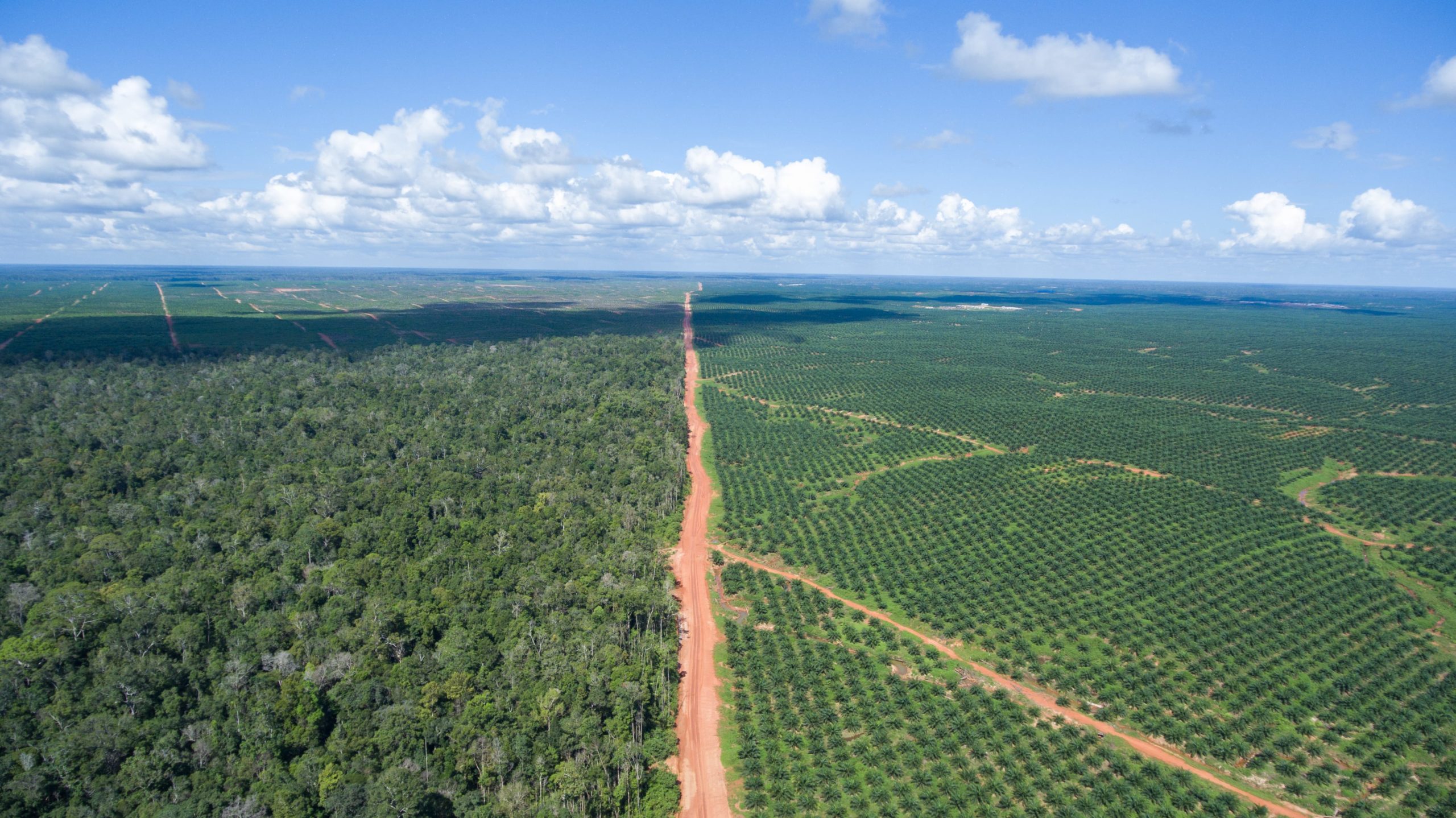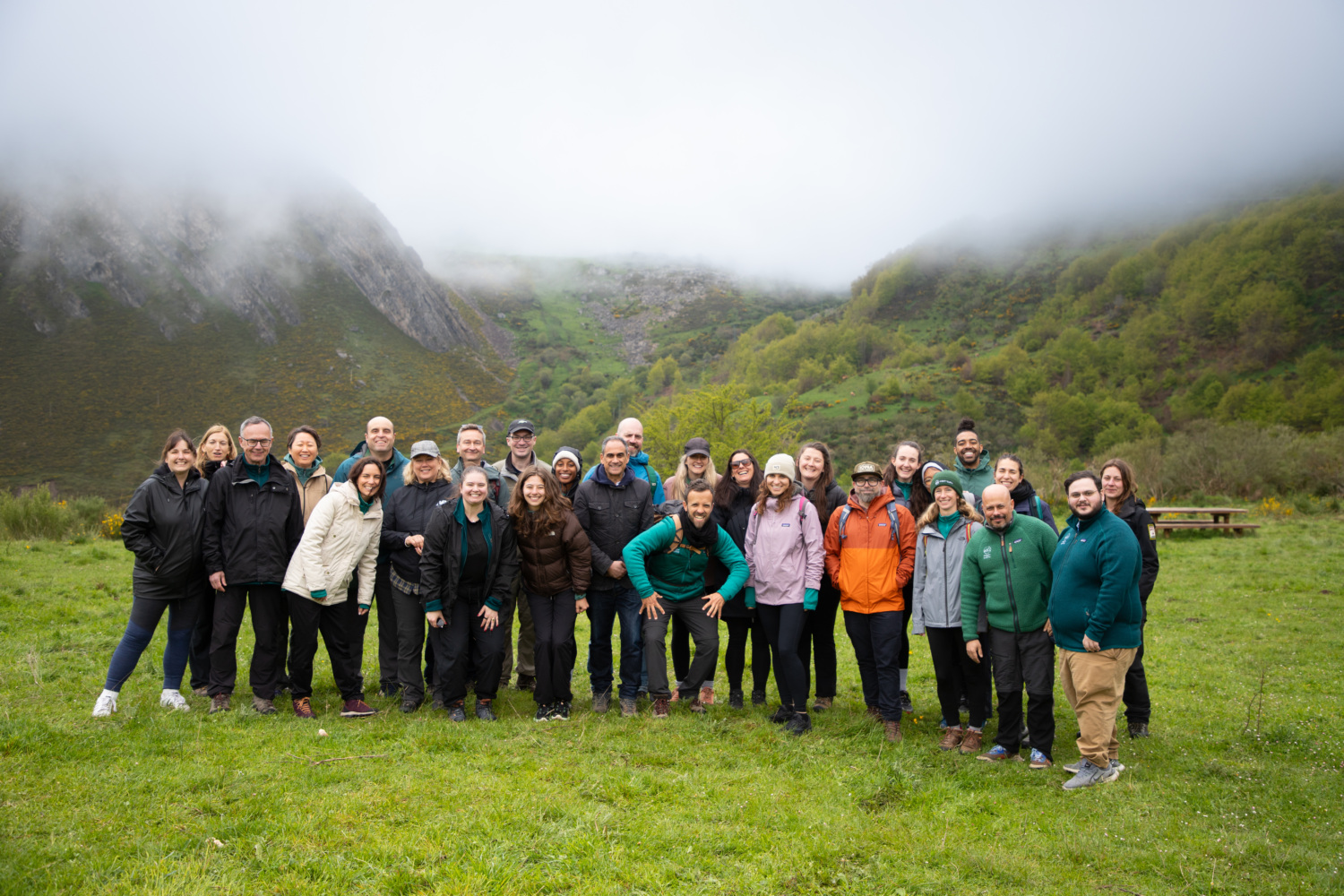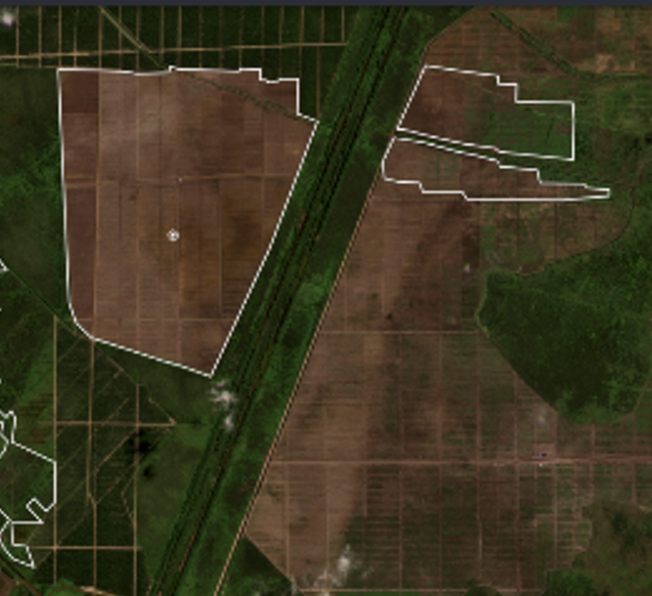
Largest Dutch pension fund involved in clearing rainforest
ABP invests in controversial palm oil plantation in Papua
3 April 2018. Leontien Aarnoudse for OneWorld magazine.
Over 27,000 hectares of tropical rainforest has been cleared for a single palm oil plantation in Papua Indonesia. Satellite images from the American organization Mighty Earth shows this clearing of the rainforest. The company that caused the deforestation is partly funded with Dutch pension money of ABP, the fifth largest pension fund of the world.
Linus Batia Omba (29) is not easily frightened, but this time he was. “They were shooting right over my head. The bullet hit my hair, but I was not hurt.” The Indonesian Papua resident tells how Indonesian soldiers intimidated him, because he stood up for the land rights of the Mandobo, who lived in the area where the palm oil plantation is located now.
174 million from pension fund ABP
In the South-Eastern Merauke regency, an area larger than the municipality of Amsterdam has been cleared for just one oil palm farm: PT Bio Inti Agrindo (PT BIA). Satellite images made by the environmental organization Mighty Earth showed that. The logging is not an illegal activity as the company received a permit from the Indonesian government. However, the area consisted of virgin forests, and half of it was primary forest, according to maps from the Indonesian Ministry of Forests. Clearing primary forest is a no-go in various international guidelines.
According to the World Wildlife Fund, the rainforests on the island of New Guinea – which Papua is part of – are the third largest in the world. 5 percent of all species of animals in the world live on this small part of the earth, two thirds of these animals can only be found on this island. “The forests are relatively pristine. Their conservation is essential for nature conservation”, says Lars Hein, Dutch professor of ecosystem services and environmental change at the Wageningen University in The Netherlands.
Local residents say that before the arrival of the plantation they were not sufficiently informed about the use of the land where they lived. They also explained that a river they used for drinking water, is contaminated because the plantation company discharges its wastewater there. PT BIA is mainly owned by Posco Daewoo, a South Korean company specialized in international trade, steel processing, oil, gas, coal and palm oil. The Dutch pension fund ABP is investing four million euros in Posco Daewoo, and a total of more than 174 million euros in all business units of Posco Daewoo, Posco and Daewoo.
|
Logging with a permit In January 2007 PT BIA obtained a license from the Indonesian government for the construction of an oil palm plantation in the Ulilin district, which is located in the Merauke Regency. In 2013, 36,400 hectares of forest land were allocated, three quarters of which (27,369 hectares) have already been deforested. |
‘Burning skin’
The residents of the area say that they were not sufficiently consulted in advance of this large scale deforestation. (see box). “This land is intended for our children and grandchildren. Nobody asked us on forehand if they could use our land”, Omba says via an interpreter on the telephone. He stands under an oil palm in a place where the rainforest was uprooted in 2010, and which was also home to protected animals, including the tree kangaroo, the cuscus – a nephew of the marsupial -, the cassowary bird and the bird of paradise. There were deer, kangaroos and wild boars living in this jungle. But when the rainforest was replaced by oil palms, little of the rich fauna remained.
The reason Omba tells his story on the phone is because it is almost impossible for foreign journalists to access Papua. The Indonesian government keeps the area closed off properly. And with twenty army posts and military checkpoints in the area, slipping in with blond hair is practically impossible.
Because of that, local pastor Nicodemus Rumbayan (38) also tells us about the consequences of the disappearing rainforest through his cell phone. “Now that there is no more forest, it is warmer here. There are floods and people beg for food because they have lost their source of income.” He tells how people used to get young bamboo from the forest. And sago, a traditional staple food that residents extract from the marrow of a tree trunk. “What should the people live off now that the rainforest is no longer here?”, he asks himself. “If you have no land, you can’t collect firewood or hunt for wild boar that you eat or sell for money. The Marind, Mandobo and Yeinan communities have lost their source of income.”
The Bian River has also been polluted by the palm oil company, says another pastor, Anselmus Amo (39): “PT BIA dumps its waste water underground and it ends up in the river.” Pastor Rumbayan adds: “In 2015, I held a service in the Silil village, the fish in the Bian river there were all dead.” He continues: “Some people, including myself, itching and a burning skin because of the river water.”
| No permission
The Catholic pastor Anslemus Amo, who lived in the area for many years and listened to plenty of people’s stories, says that when the palm oil company started logging, no Free, Prior and Informed Consent (FPIC) was done. This is a fixed human right for the local residents, which companies and governments must adhere to. Posco Daewoo reports in a written response that it has carried out FPIC. The spokesperson of the company also states that several public hearings took place. Amo confirms that, but states: “Public hearings are not the same as FPIC.” On request, Posco Daewoo’s spokesperson sends a signed agreement on land rights (2016), and another document indicating that the affected communities have received compensation (2010). Pastor Rumbayan places the signatures in a different light: “When PT BIA came here, they negotiated with individuals pretending to represent traditional land rights.” He sent a document about a lawsuit against the company and another community as they believe that they’ve received unjustified compensation for land that did not belong to them. Posco Daewoo claims to have never received a lawsuit document, and points out that these land conflicts occur in the adjacent area. In any case, it is a complicated puzzle, from which a clear conclusion can be drawn: there is still no consensus on the land rights. |
‘Contributing to a sustainable world’
On its website, the Dutch pension fund ABP claims that it wants ‘a good pension for everyone’ and wants to ‘contribute to a sustainable world’. However, neither ABP nor asset manager APG, which owns the listed shares of Posco Daewoo, are members of the Roundtable on Sustainable Palm Oil (RSPO), which is a standard for sustainable palm oil. This initiative, of which several financiers are members, does not guarantee but makes an attempt to prevent human rights violations and deforestation of primary forests. APG says it encourages companies in which it invests to become a RSPO-member, like Posco Daewoo, which applied for membership in December 2017.
ABP also has climate ambitions. Their Sustainable and Responsible Investment report (2016) states that the pension fund wants the companies in which it invests to emit less CO2. A promise that conflicts with the practice of companies that remove tropical forests, as they store CO2. Tropical forests contain about a quarter of all carbon stored in trees and the vegetation on the land. Deforestation therefore leads to a large emission of CO2. According to scientists, 10 percent of global CO2 emissions is caused by deforestation in the tropics.
158 fires
When you think of deforestation, you think of chainsaws and excavators. But there is another way to clear the green: by burning it. It is a dangerous, polluting method that is forbidden in Indonesia. In the report Burning Paradise (2016), that research agency AidEnvironment made on behalf of Mighty Earth, it states that there were 158 fires in PT BIA’s permit area in September and October 2015.
That was the year in which Indonesia had to deal with numerous forest and peat fires. The suffocating smoke caused an estimated 100,000 premature deaths and Indonesia became one of the world’s largest CO2 emitters. It is unclear whether the fires on PT BIA’s site have been lit by Posco Daewoo or not. Posco Daewoo claims that the fires are caused by the natural phenomenon El Niño. But lighted or not, the Indonesian government holds companies responsible for the fires within their concession area. It is remarkable that the fires took place in the Eastern area, where according to satellite images earlier that year large trees have been removed, probably for the timber sale.
Conscious risks
More information on the estimated impact of the palm oil company on the living environment can be found in a leaked analysis report of 228 pages. This so-called AMDAL analysis is mandatory for the construction of a new oil palm plantation, but these reports are rarely seen by the public. The report is full of examples showing that PT BIA was fully aware of the numerous risks its arrival would bring.
It says: “The migration of protected wild animals for mammalian species cuscus, tree kangaroo, and deer is permanent and irreversible.” And makes these predictions: “the degradation of Bian River’s and Fly River’s water quality, the increasing rate of soil erosion, the disturbance to protected flora/vegetation and fauna/wild animals, local community’s complaint and restlessness (community’s perception),, community’s health”. And this: “A less healthy utilization of water shall make it easier for community to catch diarrhea and skin diseases”. Exactly what happened to Pastor Rumbayan.
Posco Daewoo reports that they test the river water every six months. The test results state that the water meets the quality standards, as Posco Daewoo claims. But it also states that the test samples were brought in in an unsealed jerry can or bottle. In 2015, it is explicitly stated that the samples were supplied by the company itself. Which makes the reliability of the results questionable.
A frequently heard argument is that palm oil companies contribute to economic development in a particular region. After all, a large plantation offers infrastructure and work to many employees, in this case to more than 3,000 people. But those jobs are not for everyone. PT BIA, for example, brings in most employees from other islands such as Java or Flores, says Father Rumbayan. The medical service and after-school activities that PT BIA would offer, as stated in their sustainability report, are unknown to the pastor.
Stay or walk away?
In 2015, the Norwegian Government Pension Fund decided to exclude Global Posco Daewoo from investment because of an ‘unacceptable risk’ of ‘severe environmental damage caused by the conversion of tropical forest to oil palm plantations’. The question is whether ABP will also do that. “We strive to not run away from the problems immediately,” says APG’s Director of Global Responsible Investment & Governance Yoo-Kyong Park, who also speaks on behalf of ABP. “We would rather do our best to change the behaviour of the company. We want to use our power to exert pressure as a shareholder.”
A spokesperson for Posco Daewoo reports that “PT BIA has decided to stop forest felling for now, until a consultant gives further advice”. But the promised contract from the end of February with that consultant, isn’t there yet. And Posco Daewoo didn’t announce its halt on the forest clearing to the audience. “We expect to sign a contract this month”, writes the spokesperson at the beginning of March.
Deborah Lapidus, campaigner at Mighty Earth, is in discussion with both parties and says: “ABP has constructively engaged with Posco Daewoo over several months, who blatantly lie about its progress.” If the company does not keep its promises, ABP must impose sanctions, she says: “We ask Posco Daewoo to announce a public moratorium on new development, and to hire a credible consultant to help clean up its act. If Posco Daewoo doesn’t deliver within two weeks, ABP should withdraw its investments.”
The Dutch environmental organization Milieudefensie follows the discussions from the Netherlands. The action group demands that ABP no longer invests in companies that take part in deforestation, such as Posco, and requests the pension fund to withdraw its investments.
Campaign manager for the forests of Friends of the Earth Rolf Schipper: “The fact that ABP invests in palm oil companies that destroy rainforests is incomprehensible. You must be able to trust that your pension money contributes to a better world, as ABP states, and not to large- scale deforestation, human rights violations or the extinction of wild animals.”
Read the original article in Dutch
All rights reserved.


